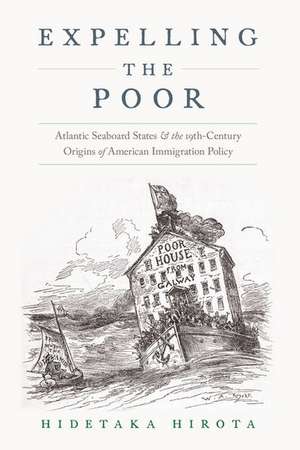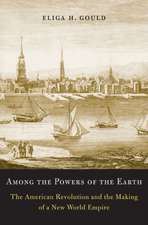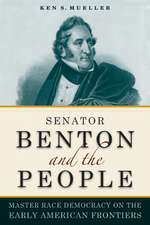Expelling the Poor: Atlantic Seaboard States and the Nineteenth-Century Origins of American Immigration Policy
Autor Hidetaka Hirotaen Limba Engleză Paperback – 13 aug 2019
| Toate formatele și edițiile | Preț | Express |
|---|---|---|
| Paperback (1) | 174.51 lei 31-37 zile | |
| Oxford University Press – 13 aug 2019 | 174.51 lei 31-37 zile | |
| Hardback (1) | 309.78 lei 31-37 zile | |
| Oxford University Press – 23 feb 2017 | 309.78 lei 31-37 zile |
Preț: 174.51 lei
Preț vechi: 212.42 lei
-18% Nou
Puncte Express: 262
Preț estimativ în valută:
33.39€ • 36.39$ • 28.14£
33.39€ • 36.39$ • 28.14£
Carte tipărită la comandă
Livrare economică 12-18 aprilie
Preluare comenzi: 021 569.72.76
Specificații
ISBN-13: 9780190055561
ISBN-10: 0190055561
Pagini: 320
Ilustrații: 13 illus.
Dimensiuni: 155 x 231 x 23 mm
Greutate: 0.45 kg
Editura: Oxford University Press
Colecția OUP USA
Locul publicării:New York, United States
ISBN-10: 0190055561
Pagini: 320
Ilustrații: 13 illus.
Dimensiuni: 155 x 231 x 23 mm
Greutate: 0.45 kg
Editura: Oxford University Press
Colecția OUP USA
Locul publicării:New York, United States
Recenzii
A superbly disruptive new book ... Expelling the Poor helps explain the powerful federal system of subsequent centuries, but as a history of the nineteenth century, it illustrates localism and inconsistency.
Hidetaka Hirota has written one of the most important recent books on the history of immigration to the United States. He breaks important new ground with his study but has also produced a work that, though focused on the nineteenth century, still speaks to current debates on immigration. He highlights more continuity in the story of immigration regulation than has been traditionally recognized.
Expelling the Poor combines analysis of law-making with heart-wrenching social history of Irish deportee experiences. Through his careful attention to the lives of these unwanted outcasts, Hirota goes some way to restoring the dignity stripped from them in the course of multiple forced Atlantic crossings.
[S]eminal....[P]resents a virtual treasure trove of research and analytical insights that will set the pace for ensuing scholarship on U.S. immigration.
In this important and very timely book, historian Hirota goes back to the beginnings of the debate over immigration to the US to look at the origin of formal immigration policy. He focuses on the many thousands of Irish, most desperately poor, who began arriving in ever-increasing numbers in the early 19th century....By including the story of those who were not allowed entry and deported, the author makes an important contribution to the study of Irish immigration. The book's great strength is as a pioneering study of immigration policy. It is very readable and will be accessible to anyone interested in the development of immigration policy, as well those primarily concerned with current policy.
Significant and innovative....A major book in the study of U.S. state immigration policy, the best in the field to date....Expelling the Poor raises timely questions about the ways immigration laws and their enforcement, in the nexus of ignorance and nativism, create and exacerbate poverty.
Hirota has written a stunning and major book....His work [is] an impressive and path breaking study....Hirota's revelations carry forward to the present....In the last four years a record number of bills dealing with immigration have been introduced into state legislatures. Today's struggles are no longer about Irish paupers but the conflict over immigration, whether at the state or federal levels seems to have no end.
Expelling the Poor shows how state authorities on the East Coast fashioned the first regulations designed either to prevent the landing of undesirable immigrants or to ensure their expulsion to 'whence they came.' Moreover, Hirota's painstaking research reveals that these nativist reactions to Irish immigration in Atlantic Seaboard states were actually instrumental to the development of what eventually became a restrictive federal immigration regime by the end of the nineteenth century. This pioneering book skillfully blends the insights of migration and legal history in a narrative that interlaces events on a local, state, national, and transnational scale. It will change the way we research and teach the development of American immigration policy.
Hidetaka Hirota's finely written analysis of nineteenth-century immigration control provides a corrective to the long-held belief that immigration was unregulated before the late 1800s when federal immigration laws were passed restricting Chinese immigration....Hirota skillfully merges anti-Catholic Irish sentiments within a narrative of anti-poverty contempt....His exhaustive archival research in Ireland, England, Massachusetts, and New York provides heart-wrenching examples of what the Irish poor suffered in America as well as the degradation of deportation to a land that rejected them because of their poverty, only to start the cycle over again. Hirota persuasively demonstrates that the initial policies of New York and Massachusetts created a model for federal immigration laws that would nationalize denying entry to immigrants in poverty, a sad commentary of an American precedent established in the treatment of refugees and the poor.
Expelling the Poor is the first book-length treatment of how antebellum immigration restriction emerged from centuries-old restrictions on the residence and mobility of the poor. In showing how indigent Irish migrants in the nineteenth century were shunted between the United States, Great Britain, and Ireland, Hirota contributes towards rethinking the historiography of immigration restriction in the United States, which has conventionally dated the beginnings of immigration restriction to the Chinese Exclusion laws of the 1880s. This is a major accomplishment.
An essential contribution to the history of immigration law in the United States, Hirota's meticulously researched volume traces the evolution of municipal and state immigration policies and practices designed to exclude undesirable trans-Atlantic migrants, especially Irish Catholic paupers, from New York and Massachusetts, before and during the Civil War. Tackling a long understudied chapter in America's peopling, Hirota adeptly demonstrates how state restrictions designed to exclude those deemed potential public charges and culturally too alien for assimilation eventually became the foundation of the federal government's plenary power over immigration and later patterns of exclusion and deportation.
Meticulously researched and compellingly written, Expelling the Poor traces the evolution of state and local immigration regulation on the Atlantic seaboard over the course of the nineteenth century. With his uniquely comprehensive analysis of this key formative period, Hidetaka Hirota offers an essential new perspective on how federal immigration law came to be what it is today.
In Expelling the Poor, Hidetaka Hirota uncovers the forgotten story of the tens of thousands of Irish immigrants who were deported from the United States in the mid-nineteenth century solely because they were poor. It is a great book on a vitally important and timely subject.
Hidetaka Hirota's Expelling the Poor is an exceptional, deeply researched, and timely study that transforms our understanding of U.S. immigration history and of Irish American studies. Shockingly, Hirota demonstrates that in the mid-nineteenth century Massachusetts and New York officials, inspired by nativism, anti-Catholicism, and what would now be called neoliberalism, excluded and/or deported roughly 100,000 would-be immigrants to the United States: mostly Irish paupers, many of them helpless widows and orphans, often expelled in the cruelest and most autocratic manner. As Hirota also shows, these vicious state policies were later adopted on the federal level, and, indeed, they are implemented today against the immigrants and refugees that US economic and foreign policies have uprooted from their homes.
Hidetaka Hirota has written one of the most important recent books on the history of immigration to the United States. He breaks important new ground with his study but has also produced a work that, though focused on the nineteenth century, still speaks to current debates on immigration. He highlights more continuity in the story of immigration regulation than has been traditionally recognized.
Expelling the Poor combines analysis of law-making with heart-wrenching social history of Irish deportee experiences. Through his careful attention to the lives of these unwanted outcasts, Hirota goes some way to restoring the dignity stripped from them in the course of multiple forced Atlantic crossings.
[S]eminal....[P]resents a virtual treasure trove of research and analytical insights that will set the pace for ensuing scholarship on U.S. immigration.
In this important and very timely book, historian Hirota goes back to the beginnings of the debate over immigration to the US to look at the origin of formal immigration policy. He focuses on the many thousands of Irish, most desperately poor, who began arriving in ever-increasing numbers in the early 19th century....By including the story of those who were not allowed entry and deported, the author makes an important contribution to the study of Irish immigration. The book's great strength is as a pioneering study of immigration policy. It is very readable and will be accessible to anyone interested in the development of immigration policy, as well those primarily concerned with current policy.
Significant and innovative....A major book in the study of U.S. state immigration policy, the best in the field to date....Expelling the Poor raises timely questions about the ways immigration laws and their enforcement, in the nexus of ignorance and nativism, create and exacerbate poverty.
Hirota has written a stunning and major book....His work [is] an impressive and path breaking study....Hirota's revelations carry forward to the present....In the last four years a record number of bills dealing with immigration have been introduced into state legislatures. Today's struggles are no longer about Irish paupers but the conflict over immigration, whether at the state or federal levels seems to have no end.
Expelling the Poor shows how state authorities on the East Coast fashioned the first regulations designed either to prevent the landing of undesirable immigrants or to ensure their expulsion to 'whence they came.' Moreover, Hirota's painstaking research reveals that these nativist reactions to Irish immigration in Atlantic Seaboard states were actually instrumental to the development of what eventually became a restrictive federal immigration regime by the end of the nineteenth century. This pioneering book skillfully blends the insights of migration and legal history in a narrative that interlaces events on a local, state, national, and transnational scale. It will change the way we research and teach the development of American immigration policy.
Hidetaka Hirota's finely written analysis of nineteenth-century immigration control provides a corrective to the long-held belief that immigration was unregulated before the late 1800s when federal immigration laws were passed restricting Chinese immigration....Hirota skillfully merges anti-Catholic Irish sentiments within a narrative of anti-poverty contempt....His exhaustive archival research in Ireland, England, Massachusetts, and New York provides heart-wrenching examples of what the Irish poor suffered in America as well as the degradation of deportation to a land that rejected them because of their poverty, only to start the cycle over again. Hirota persuasively demonstrates that the initial policies of New York and Massachusetts created a model for federal immigration laws that would nationalize denying entry to immigrants in poverty, a sad commentary of an American precedent established in the treatment of refugees and the poor.
Expelling the Poor is the first book-length treatment of how antebellum immigration restriction emerged from centuries-old restrictions on the residence and mobility of the poor. In showing how indigent Irish migrants in the nineteenth century were shunted between the United States, Great Britain, and Ireland, Hirota contributes towards rethinking the historiography of immigration restriction in the United States, which has conventionally dated the beginnings of immigration restriction to the Chinese Exclusion laws of the 1880s. This is a major accomplishment.
An essential contribution to the history of immigration law in the United States, Hirota's meticulously researched volume traces the evolution of municipal and state immigration policies and practices designed to exclude undesirable trans-Atlantic migrants, especially Irish Catholic paupers, from New York and Massachusetts, before and during the Civil War. Tackling a long understudied chapter in America's peopling, Hirota adeptly demonstrates how state restrictions designed to exclude those deemed potential public charges and culturally too alien for assimilation eventually became the foundation of the federal government's plenary power over immigration and later patterns of exclusion and deportation.
Meticulously researched and compellingly written, Expelling the Poor traces the evolution of state and local immigration regulation on the Atlantic seaboard over the course of the nineteenth century. With his uniquely comprehensive analysis of this key formative period, Hidetaka Hirota offers an essential new perspective on how federal immigration law came to be what it is today.
In Expelling the Poor, Hidetaka Hirota uncovers the forgotten story of the tens of thousands of Irish immigrants who were deported from the United States in the mid-nineteenth century solely because they were poor. It is a great book on a vitally important and timely subject.
Hidetaka Hirota's Expelling the Poor is an exceptional, deeply researched, and timely study that transforms our understanding of U.S. immigration history and of Irish American studies. Shockingly, Hirota demonstrates that in the mid-nineteenth century Massachusetts and New York officials, inspired by nativism, anti-Catholicism, and what would now be called neoliberalism, excluded and/or deported roughly 100,000 would-be immigrants to the United States: mostly Irish paupers, many of them helpless widows and orphans, often expelled in the cruelest and most autocratic manner. As Hirota also shows, these vicious state policies were later adopted on the federal level, and, indeed, they are implemented today against the immigrants and refugees that US economic and foreign policies have uprooted from their homes.
Notă biografică
Hidetaka Hirota is a Visiting Assistant Professor of History at the City College of New York. He was formerly a Mellon Research Fellow in the Society of Fellows in the Humanities at Columbia University.














